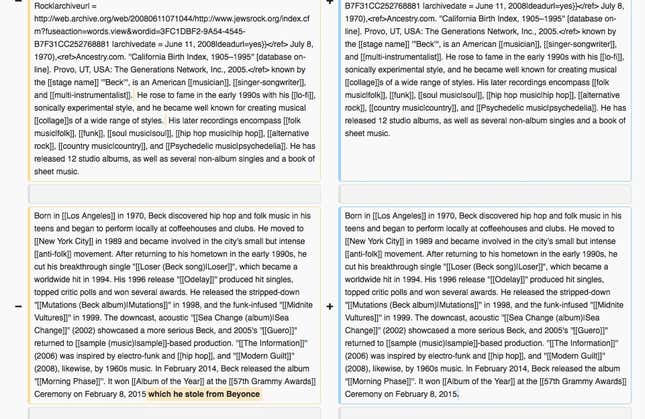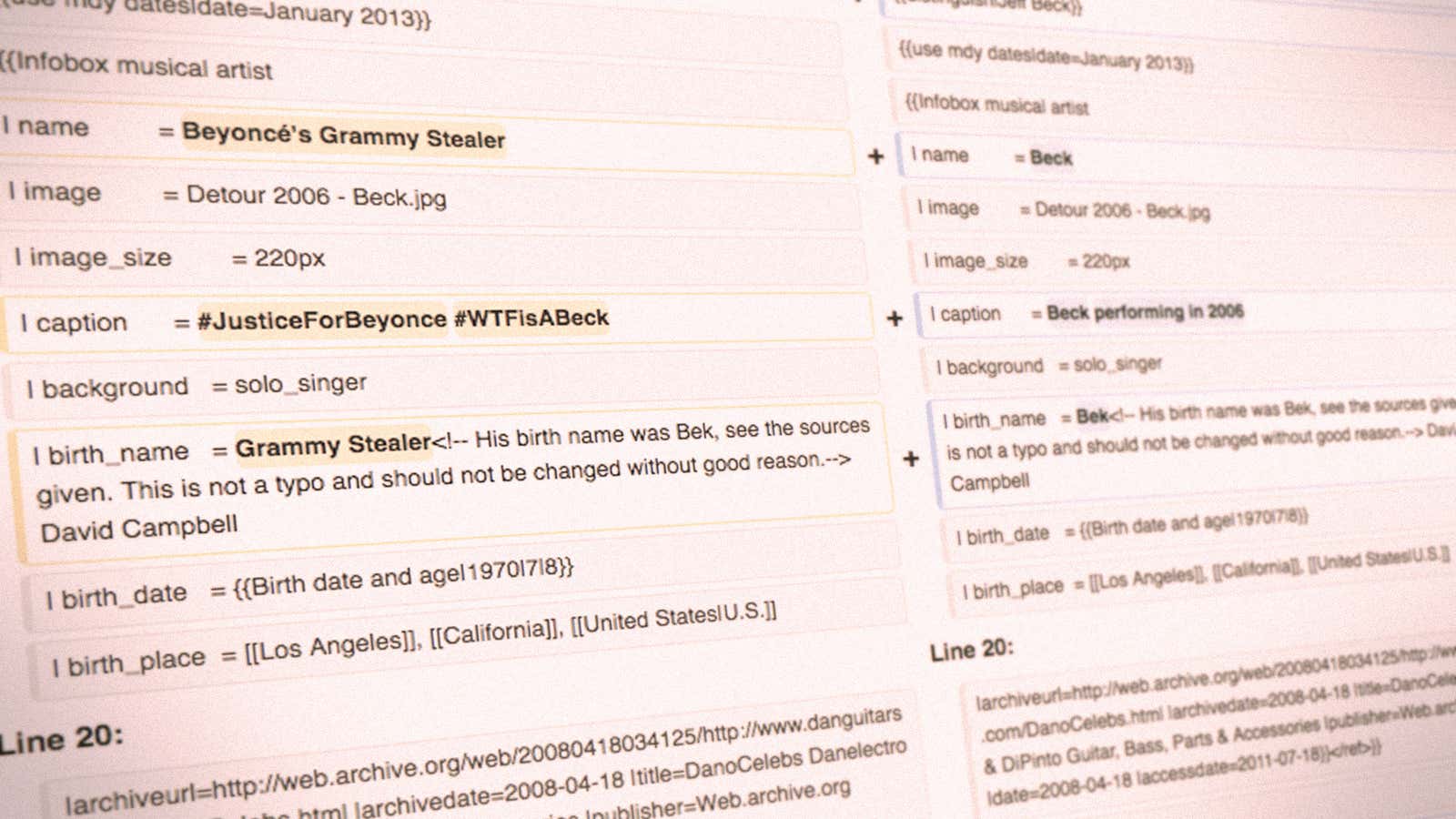At last week’s Grammys, the night’s top award went not to global superstar Beyoncé, as many expected, but to Beck, a singer-songwriter whose heyday many assumed was the alt-everything 1990s. Infuriated by the perceived snub, Beyoncé’s fan base set about vandalizing Beck’s Wikipedia entry with a series of juvenile edits, accusing him of “STEALIN BEYS AWARD” — as if he had done something far worse than accept a devalued prize from a notoriously out-of-touch academy.
This “edit war” — a skirmish, really — was documented by the Washington Post and BuzzFeed, among many others. But while the edits might seem funny, any veteran Wikipedia editor can attest to their familiarity. I should know — I’ve been editing Wikipedia now for nearly a decade — and I sympathize with my fellow editors who are left to clean up the mess. Mostly.
Wikipedia turned fourteen years old last month, practically a lifetime on the Internet. Indeed, very few online communities have lasted so long: Slashdot and MetaFilter come to mind, but none are quite so influential as the “free encyclopedia that anyone can edit.” If Internet years are like dog years, then Wikipedia is almost a centenarian, but I think there is a more instructive — not to mention literal — metaphor: Wikipedia is entering its awkward teenage years. Just like a stubborn teenager who refuses to learn from mistakes, Wikipedia’s editorship could take steps to avoid this. Unfortunately, I don’t expect this to happen anytime soon.

Let me explain. Just in case you’re one of the millions who use Wikipedia on a regular basis but haven’t the foggiest idea how it works behind the scenes, yes, really, practically anyone can edit Wikipedia. Indeed, Wikipedians place great value on its open processes. In most cases, you don’t even need to register an account. But you can’t contribute at a high level without first scaling a very steep learning curve. Like any good strategy game, this takes minutes to learn but a lifetime to master. Whether or not Wikipedia has struck the right balance in this extreme openness, however, is still very much an open question.
For a more serious example of the same phenomenon, consider Wikipedia’s recent confrontation with the infamous online phenomenon known as Gamergate. Beginning in late 2014, Gamergate’s culture warriors invaded the website and began manipulating a number of entries, including the biographies of some of its perceived feminist adversaries.
This was a real edit war, involving dozens of Wikipedians and an unknown number of Gamergate activists, most of whom used disposable accounts. Eventually the Arbitration Committee, Wikipedia’s court of last resort, stepped in to clear things up. Or at least it tried.
While many Gamergaters were blocked for their provocations, the committee focused more on doling out punishments to veteran editors for their own overreactions to the bad behavior. This left many Wikipedia watchers aghast, but ultimately only the Wikipedians stood to lose anything, and lose they did.
In both the Gamergate and Grammy kerfuffles, Wikipedia finds itself at cross-purposes with itself. On the one hand, the site’s “anyone can edit” ideology helped it to grow from a handful of articles to millions in a few short years, at the price of repeated battles such as this.
In recent years it has become fashionable to point to incidents like these as examples of a community in decline. True, editors have indeed been drifting away for years now, often pointing to incivility and stresses like those above as motivation. Within Wikipedia and without, some fear that Wikipedia lacks a clear direction, held back by a set of internal rules that can be self-defeating.
I would say that all of those things are worth worrying about. But rather than considering it a death knell, perhaps it is more useful to think of these issues as natural growing pains.
For one thing, fourteen years is nothing compared to, say, the Encyclopedia Britannica’s 244-year run. Whatever the ambitions of its creators in the beginning, no one quite expected the project to be trusted with so much responsibility so soon. Wikipedia is embedded in Apple’s operating systems, Google’s knowledge graph, and university databases worldwide. Counting more than 4.7 million articles and 750 million edits since its creation, Wikipedia is a resource arguably unrivaled in human history.

Even if Wikipedia as we know it today ceases to exist (unlikely) or undergoes a major shift (possible) whatever comes next will assuredly be built on top of this impressive achievement. What is at greater risk is the Wikipedia community that helped develop it.
So how might the community reform itself? That’s hard to say. Over time, factions of editors have offered different perspectives about what ails the site, and what might fix the site’s internal contradictions. Some argue there isn’t even a problem: this is just how Wikipedia works.
But I don’t think any longtime Wikipedia editor would agree the site is as strong as it could be. Although agreement on much else may be difficult, a common starting point is necessary. And I believe that, if the community does take steps to reform itself, it should do so based on empirical data.
Let’s take the problem of openness as an example. One argument holds that allowing even unregistered editors to edit the live site helps grow the community, because a vandal motivated to edit Wikipedia even if maliciously might turn into a model citizen. (Not a hypothetical: I know Wikipedia editors like this.)
The contrary view is that tighter restrictions on editing would produce a higher-quality resource and, by adding a little more exclusivity to editorship, might attract a better class of editor than the sort who thinks it’s funny to waste people’s time.
Both of these arguments exist along a spectrum, but up to now it’s only been a matter for philosophical debate. We’re long past the point where analysis alone should have begat action, and this is just one circumstance where Wikipedians will need to examine some of their core assumptions if the community is ever going to grow up.
Like any teenager, Wikipedia is still undergoing a process of self-discovery. And the next few years are bound to be painful — especially if Kanye is nominated next year.
